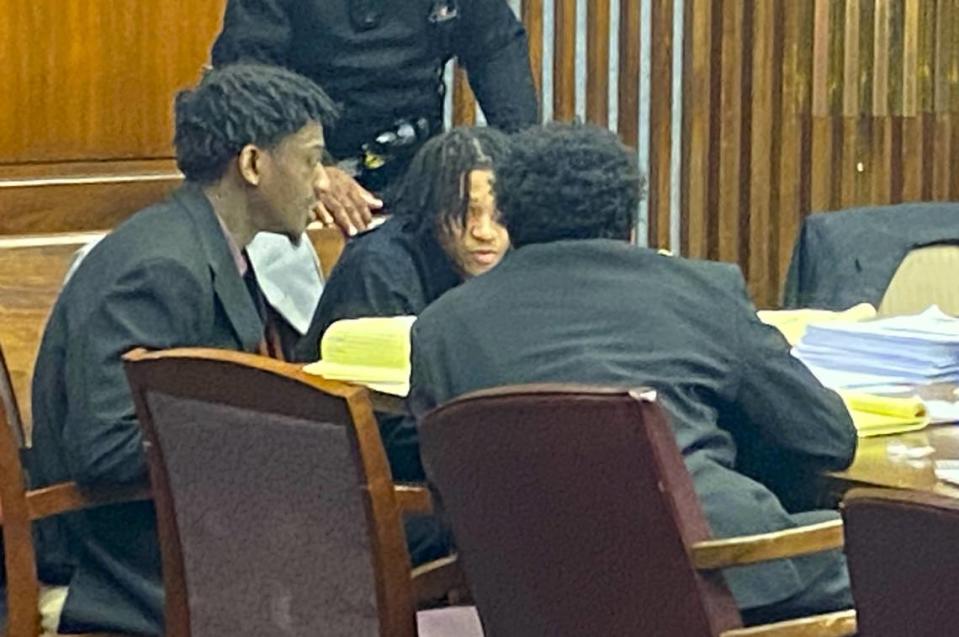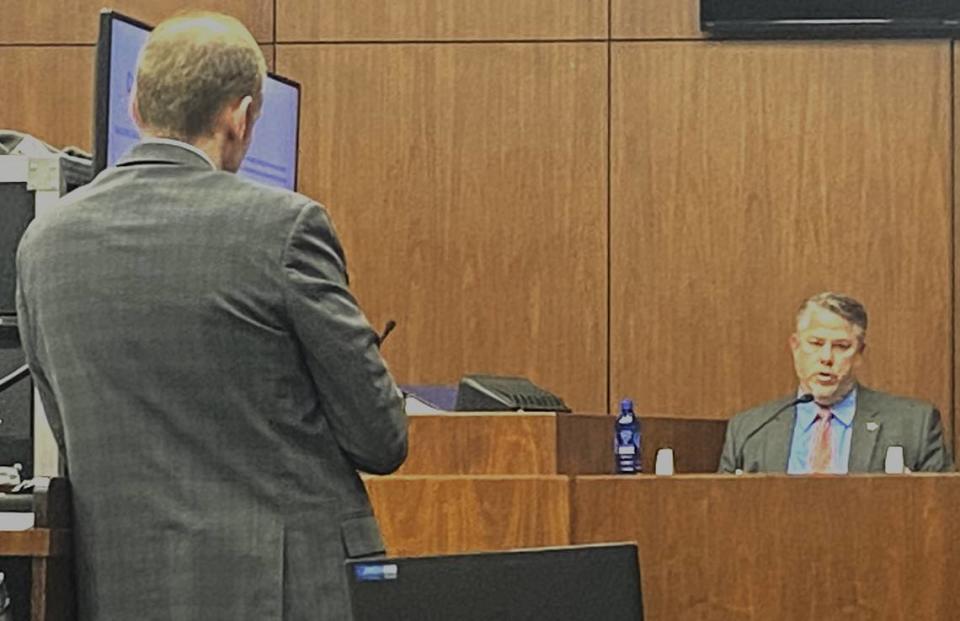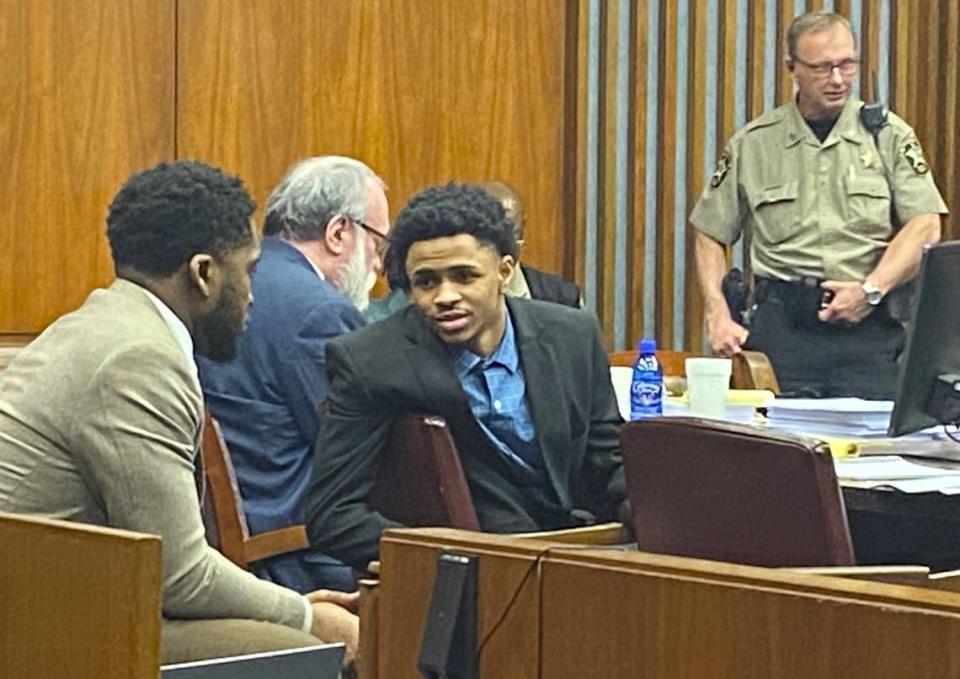Raiders, Indians, Yankees, colors: Columbus ‘Insane Crips’ trial digs into gang culture
No one on trial for murder in the allegedly gang-related death of a South Carolina man at Columbus’ Wilson Homes apartments is accused of shooting him intentionally.
Instead three alleged “Insane Crips” being tried in the 2021 slaying of Marcel Samedi are charged with causing his death while committing other felonies to further the interest of their gang.
So prosecutors allege they were not out to kill Samedi, the night he was shot, but to target others who had drawn the gang’s ire.
They soon will learn their fate, as the trial now in its third week nears an end. Attorneys are to make their closing arguments on Thursday, and then the jury will weigh the evidence before delivering a verdict.
Gang prosecutors for the Georgia attorney general have said Samedi, 21, of Rock Hill, S.C., also was in the Insane Crips, and traveled here with others for a gathering witnesses referred to as a “Crips call.”
That was on June 5, 2021, when they met first at Columbus’ Belvedere Park, ate at a Shark’s restaurant on Wynnton Road, and then went to Wilson Homes, a complex at 3400 Eighth St.
That’s where a 9-millimeter hollow-point bullet hit Samedi in the left temple around 9:45 p.m. He died face-down in the rain outside Building 108, where a woman’s apartment was peppered with shots.
A co-defendant testifying for the prosecution, Elysia Cooley, said last week that Samedi was among a crew of Crips sent on an errand that night, and that Samedi was the only one who did not return.
The men on trial in his death are Corey Troupe Jr., 26; Davion C. Dupas, 22; and Jahiem Rashard Davis, 21..

Cooley, 19, said she traveled with them in two vehicles to where Samedi was shot, but did not leave the car she was in as the others got out.
She said she heard gunfire, and then the men returned, with Troupe, Samedi’s roommate, distraught at having left Samedi behind.
Only the woman whose apartment was damaged called the police, who found the body on the ground outside. Samedi was not identified for six days.
Cooley said the shooting stemmed from a “beef” or dispute between senior leaders, called “Original Gangsters” or OGs, in rival neighborhoods.
She said her OG was Michael Douglas Brown, a leader in the Dimonwood area, who had been taunted by Makenzie “Mac 10” Pearce, the OG at Wilson Homes.
Pearce faces no charges in Samedi’s shooting, but Brown, 48, also known as “Pop” or “Mr. Dimonwood,” faces gang offenses in in the case. He has not been captured.
Cooley said the 2021 “C-call” or “Crips call” for gang members to congregate at Wilson was the set-up for Brown and Pearce to settle their differences, but Pearce didn’t show, leaving the Dimonwood gang on the lookout for him.
Gang members twice were dispatched that night, once to scout out an apartment, before returning to Wilson, and then a second time for the mission that left Samedi dead, she said. After that, they left.
Gang culture
The jury of four men and 11 women, three of them alternates to take the place of any jurors excused, has heard much about gang culture, particularly the Insane Crips
Testifying Tuesday, Lt.. Jeremy Hattaway of the Muscogee County Sheriff’s Office, a gang expert, said Columbus has had 58 different gangs over the years, and currently about 3,000 Columbus residents are gang members.
The Insane Crips, an offshoot of the national Crips gang, started in Long Beach, California, and spread from there, he said, noting locals sometimes join gangs while in prison and bring those connections home with them when they get out.
Besides Wilson Homes and Dimonwood, a neighborhood off Steam Mill Road, the gang has territory in Columbus’ East Wynnton area, he said.
The gang adds the color gray to the traditional Crips blue, and also favors professional sports teams for its insignia, he said, such as the former Oakland Raiders, now based in Las Vegas, the New York Yankees, the Cleveland Indians, and the Boston Red Sox.

Cooley said the sports merchandise signifies divisions within the gang: The “Bigs” wear Raiders gear; the “Babies” wear Cleveland Indians garb, and the “Yungs” don New York Yankees clothing.
The younger gang members are expected to work to serve the gang’s interests and improve their standing in it, and that includes going on “missions” for older gangsters, she said.
“Sometimes you have to rob people, go on missions, set somebody up, buy drugs,” she said.
They were on one of those missions when Samedi was shot, she said, but she could not explain the mission’s aim. “I don’t ask questions,” she said. “I just do them.”
Cooley was granted “transactional immunity” in exchange for testifying, meaning she won’t face additional charges for what she said in court. But she remains a defendant in the murder case, prosecutors said, so her charges still are pending.
Cooley so far faces the same counts as Troupe and Dupas.
Troupe, also known as “Lil Pop,” and Dupas, known as “Yungdemon Dee,” are on trial for six counts of violating the state Street Gang Terrorism and Prevention Act, two counts of felony murder and one count each of aggravated assault, using a firearm to commit a felony, and first-degree criminal damage to property.
Jahiem Davis, also known as “Zhg Jah,” faces eight counts of violating the Street Gang Terrorism and Prevention Act, three counts of felony murder and one count each of aggravated assault, using a firearm to commit a felony, first-degree criminal damage to property, and being a convicted felon with a firearm.
Each defendant could be sentenced to life in prison if convicted.


